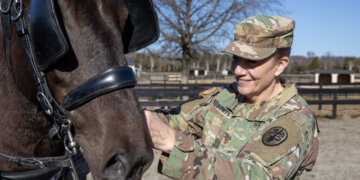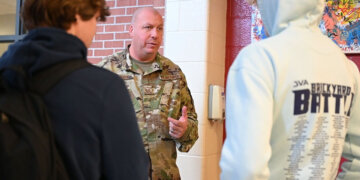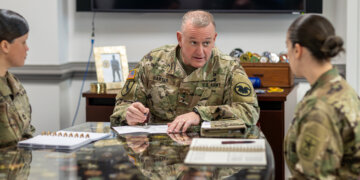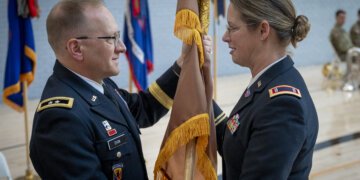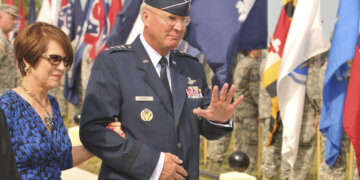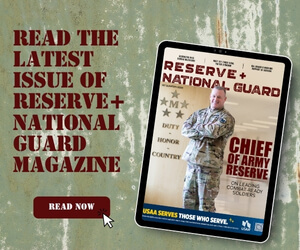I was shocked when I first heard a four-star general proclaim, “Not everyone deserves a mentor.” The late Army Gen. Robert W. Cone delivered these remarks at a conference at Fort Benning, Georgia, in 2011. He was a well-respected senior leader and, at the time, the commanding general of U.S. Army Training and Doctrine Command. The more I thought about those words, the more I realized he was correct.
If one does not keep their eyes and ears open and look for opportunities to seek mentorship, then they really do not deserve to be mentored. The responsibility in this type of relationship lies not only with the mentor but also with the mentee, something that is oftentimes not discussed. Being mentored is a privilege, not a right.
The concept of mentorship was addressed in the U.S. Army around 1985 when then-Chief of Staff of the Army Gen. John Wickham Jr. identified “leadership” as that year’s theme. Around the same timeframe, private enterprise and academia began to place more emphasis on mentoring. Most of the literature focused on the characteristics and functions of a mentor.
There seems to be two schools of thought when it comes to mentorship. Some think organizations should formalize mentoring programs, and others feel that a mentor-mentee relationship should be informal and grow naturally. I believe in the latter. However, I also believe every good leader should create an atmosphere that makes it clear they are accessible and open to a mentoring role.
More and more papers and books are being written focused on the role and function of a mentor. This includes formalizing definitions of what “mentoring” actually is. Whatever definition you want to apply to it, at its core mentoring is about developing future leaders. The overarching purpose of mentorship is to prepare people for future leadership opportunities and positions of greater responsibility.
Rather than focusing on the role of the mentor, I am going to take a different perspective and focus on the responsibility of the mentee in a mentoring relationship.
Mentorship is everywhere
In 1985, the U.S. Army conducted a survey regarding mentorship. Fifty-nine percent of the participants responded that they did not have a mentor. At that time, I was counted among that number. In retrospect, I believe the majority of our group were blind to opportunities around us. If you are looking for a mentor, many times it is as simple as seeking out someone you respect and trust, and asking them for advice.
Over the years, I have not come across many leaders in the military or private sector who would not sit down and give their time to help others learn from their experience. Depending on the chemistry generated, and the perceived interest of the mentee, a majority of those leaders would gladly continue in a long-term mentoring role.
Mentorship is all around us. It is not just something that happens in a formal one-on-one engagement between graybeard and a young disciple. Mentorship can happen anywhere, but a person has to be open to the opportunities. Mentorship exists when a senior executive chairs a meeting, an Army commander provides guidance at a training event, or a civilian business manager engages in dialogue. These are times to listen and learn.
I have learned to think of every engagement with a senior leader as a mentoring opportunity, whether that’s one-on-one or in a group setting. Observing how other leaders operate, for better or worse, might be the best mentoring opportunity that exists. A senior leader I worked for was a master at engaging others outside of our organization. He took the time to make people feel that they were critical to our mutual success and their continued support was essential. Whether he knew it or not, he was mentoring me on the importance of engaging stakeholders. I was open to this opportunity, learned the importance of these engagements, and I know I am now a better leader for it.
Mentoring is not only top-down. It occurs in a 360-degree setting. Do not only look to leaders for mentorship but also look to peers and to followers. I heard someone say, if you are the smartest guy in the room, you should find a different room. By surrounding yourself with top quality people you will become better.
My favorite Bible verse is Proverbs 27:17, “As iron sharpens iron, so one person sharpens another.” People feed off of one another. When we are at our best, we make each other stronger and better — sharper, if you will.
Mentorship is a contact sport
A mentor-mentee association is a two-way street and the mentee should play an active rather than a passive role in the relationship.
An effective mentor:
- Devotes a great deal of time and energy to the relationship
- Offers suggestions for professional development reading
A receptive mentee:
- Displays enthusiasm for the relationship with a positive attitude and openness to new ideas and suggested techniques
- Shows appreciation for the time the mentor is taking will likely lead to a fruitful and enduring relationship
- Uses active listening is important; avoid distractions during the conversation
Pay it forward
A mentee should be generous in passing on to others what they have learned and be prepared to assume a mentoring role in their own right. Be approachable and create a persona where others feel comfortable seeking your advice and counsel. Colin Powell said, “The day soldiers stop bringing you their problems is the day you’ve stopped leading them. They have either lost confidence that you can help them or concluded that you don’t care. Either case is a failure of leadership.”
Also, be aware that your actions speak volumes. Emulate the traits of the type of leader you admire and want to become. “Doing the right thing, even when no one is watching,” is a characteristic of integrity; a caveat to that is, “someone is always watching.” The way you interact with others, the demeanor you display, the respect you show, all will be a guide for others as they develop their own leadership philosophies and approaches.
Mentoring is important. It is a key tool for developing future leaders and one of the most essential responsibilities of any leader is to develop other leaders. However, everyone must take responsibility for their own leadership development. Being open to learning opportunities that present themselves, staying engaged with people you could learn from, and being generous with your time will do a great deal to grow strong leaders in your organization and beyond.


















